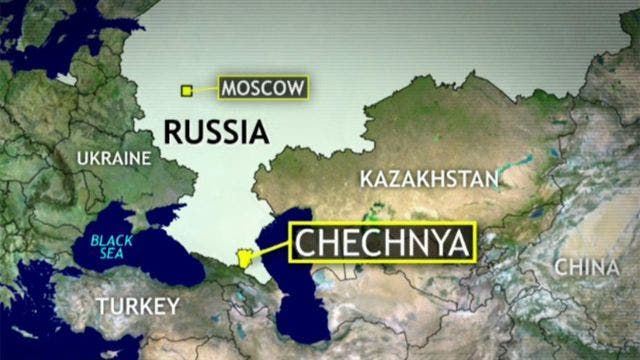But congressional researchers and foreign policy analysts have long tracked a connection between the Chechnya region and Islamic extremists sympathizing with Al Qaeda and the Taliban. If the suspects are indeed Chechen, analysts told Fox News they may represent part of a jihadi network which has made its way to American soil.
"The Chechen jihadi network is very extensive," Middle East analyst Walid Phares said Friday. "They have a huge network inside Russia and Chechnya."
John Bolton, former U.S. ambassador to the United Nations, said Chechen rebels are motivated by two things -- a desire for independence from Russia and Islamic radicalism. He speculated that, if the suspects are Chechen, they could be motivated more by the latter. "They could well be supported by a significant international network," he said.
Sources said authorities are investigating whether Dzhokhar A. Tsarnaev, 19, of Cambridge, Mass., and his brother may have had military training overseas. Reports have also indicated they have a connection with Dagestan, another restive Russian region where Islamic militants have gone after Russian targets. The uncle of the suspects told reporters late Friday morning that one of the suspects was in fact born in Dagestan, saying this has "nothing to do with Chechnya" and "Chechens are peaceful people."
Craig Albert, an expert on Chechnya and associate professor at Georgia Regents University, said any connection between these suspects and the jihadist movement in Chechnya would have "severe" implications for the U.S.
But he also said it might just be "isolated individualized terror" where the suspects are using Chechnya ties to "rationalize" violence.
The ties between major Islamic extremist groups and Chechnya, though, are well-documented, particularly pertaining to extremists' support for the separatists in Chechnya.
The Taliban, when it was in power, was one of the only governments to recognize Chechnya's independence.
An Al Qaeda-tied Chechen warlord named Ibn al-Khattab was, according to the Council on Foreign Relations
 , said to have met with Usama bin Laden during the Soviet occupation of Afghanistan. He was killed in 2002 by the Russians.
, said to have met with Usama bin Laden during the Soviet occupation of Afghanistan. He was killed in 2002 by the Russians.Signs of Islamic radicals fueling unrest in Chechnya continued to surface. According to the report by the George Washington University Homeland Security Policy Institute
 ,
foreign fighters have flocked to places like Chechnya, Bosnia and
others with a jihadi presence. The 2010 report said lands like Chechnya
-- as well as Pakistan and Somalia -- are seen by "jihadi theoreticians"
as places where "fighting is not only legitimate but also compulsory."
The same report also noted Chechen rebel leader Doku Umarov has tried to
align the insurgency "with the global jihadist narrative," supporting
the establishment of an "Islamic emirate in the Caucasus."
,
foreign fighters have flocked to places like Chechnya, Bosnia and
others with a jihadi presence. The 2010 report said lands like Chechnya
-- as well as Pakistan and Somalia -- are seen by "jihadi theoreticians"
as places where "fighting is not only legitimate but also compulsory."
The same report also noted Chechen rebel leader Doku Umarov has tried to
align the insurgency "with the global jihadist narrative," supporting
the establishment of an "Islamic emirate in the Caucasus."Whether Chechens, however, have actually gone to the frontlines in Afghanistan and Pakistan is a matter of fierce dispute. A Congressional Research Service report
 earlier this year said "some Chechen fighters fighting alongside Taliban/Al Qaeda forces have been captured or killed."
earlier this year said "some Chechen fighters fighting alongside Taliban/Al Qaeda forces have been captured or killed."But other studies have sharply questioned this kind of reporting, claiming that American officials and media were buying into a Russian narrative that Moscow was simply fighting Islamic terrorists in Chechnya.
A 2004 report from University of Massachusetts at Dartmouth professor Brian Glyn Williams
 described a more complicated picture.
described a more complicated picture."While it is certainly possible that Chechen individuals made their way to Afghanistan to fight for the Taliban in Afghanistan, the complete absence of even a single Chechen POW among the thousands captured by the Northern Alliance and the U.S. would clearly refute the wild claims that the Chechens formed the 'largest contingent of Al Qaeda's foreign legion'," he wrote.
Williams told FoxNews.com, rather, that "there's a jihad element that has grown larger and more important" inside of Chechnya in the wake of bloody wars with the Russians. He said the official leadership is more secular and moderate, but there is an extremist element that sees the Russians as "infidels." He said the Al Qaeda links are tenuous, though Al Qaeda "sympathizes" with them.
Regardless of the motivations of the suspects in the Boston bombing, which killed three and injured dozens, Phares said it is possible they still have broader "logistical support" within the United States.





No comments:
Post a Comment